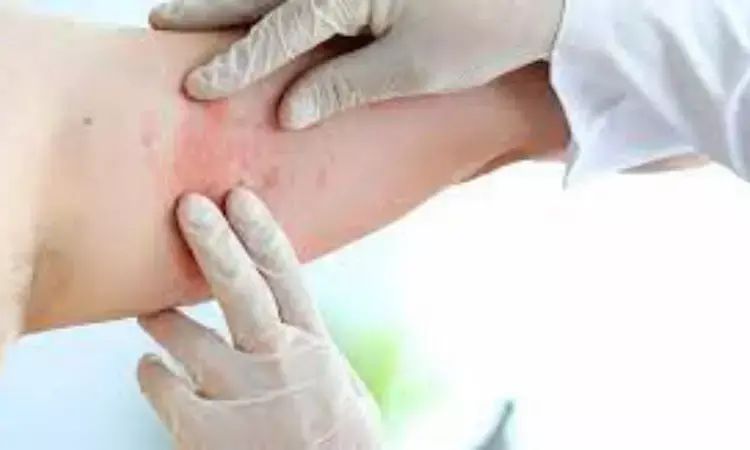- Home
- Medical news & Guidelines
- Anesthesiology
- Cardiology and CTVS
- Critical Care
- Dentistry
- Dermatology
- Diabetes and Endocrinology
- ENT
- Gastroenterology
- Medicine
- Nephrology
- Neurology
- Obstretics-Gynaecology
- Oncology
- Ophthalmology
- Orthopaedics
- Pediatrics-Neonatology
- Psychiatry
- Pulmonology
- Radiology
- Surgery
- Urology
- Laboratory Medicine
- Diet
- Nursing
- Paramedical
- Physiotherapy
- Health news
- Fact Check
- Bone Health Fact Check
- Brain Health Fact Check
- Cancer Related Fact Check
- Child Care Fact Check
- Dental and oral health fact check
- Diabetes and metabolic health fact check
- Diet and Nutrition Fact Check
- Eye and ENT Care Fact Check
- Fitness fact check
- Gut health fact check
- Heart health fact check
- Kidney health fact check
- Medical education fact check
- Men's health fact check
- Respiratory fact check
- Skin and hair care fact check
- Vaccine and Immunization fact check
- Women's health fact check
- AYUSH
- State News
- Andaman and Nicobar Islands
- Andhra Pradesh
- Arunachal Pradesh
- Assam
- Bihar
- Chandigarh
- Chattisgarh
- Dadra and Nagar Haveli
- Daman and Diu
- Delhi
- Goa
- Gujarat
- Haryana
- Himachal Pradesh
- Jammu & Kashmir
- Jharkhand
- Karnataka
- Kerala
- Ladakh
- Lakshadweep
- Madhya Pradesh
- Maharashtra
- Manipur
- Meghalaya
- Mizoram
- Nagaland
- Odisha
- Puducherry
- Punjab
- Rajasthan
- Sikkim
- Tamil Nadu
- Telangana
- Tripura
- Uttar Pradesh
- Uttrakhand
- West Bengal
- Medical Education
- Industry
Single application of spinosad effective for scabies treatment in children: Study

USA: Spinosad 0.9% shows promise as a potential treatment against Scabies in children aged 4 years or older, according to a recent study.
The study, published in the Journal of the American Academy of Dermatology, found that spinosad at 0.9% performed better than vehicle for scabies treatment in subjects of 4 years of age or older when applied as a single topical treatment from the neck down and left on the skin for a least 6 hours prior to being washed off.
Scabies is a contagious skin disease that results from Sarcoptes scabiei infestation. It occurs most frequently in children and young adults, with outbreaks in child care facilities and schools being the most common. Currently, there are no approved over-the-counter treatments, and approved prescription products have some shortcomings including potential resistance.
Spinosad is an insecticide derived from the fermentation of a soil actinobacterium. It shows promise as a potential treatment agent. In the study, Kerry W. Mettert, ParaPRO LLC, Carmel, Indiana, and colleagues evaluated the efficacy of 0.9% spinosad topical suspension in the eradication of scabies using combined results from 2 controlled clinical studies.
Each study included index subjects (the youngest household members with active scabies) and up to 5 other members in each household. They were applied 0.9% spinosad or vehicle once.
Primary efficacy was the percentage of index subjects with complete cure on day 28.
Based on the study, the researchers found the following:
- Spinosad at 0.9% is not equivalent to vehicle in the percentage of index subjects achieving complete cure on day 28 (78.1% vs 39.6%, respectively; n = 206).
- Additional efficacy analyses confirmed the consistent treatment effect of 0.9% spinosad.
- No safety signals were observed.
"Spinosad at 0.9% performed better than vehicle in the treatment of scabies in these studies of subjects of 4 years of age or older following 1 application of study drug," wrote the authors. "Limited safety findings suggest that the product is well tolerated by subjects as young as 4 years of age."
Reference:
The study titled, "Spinosad at 0.9% in the treatment of scabies: Efficacy results from 2 multicenter, randomized, double-blind, vehicle-controlled studies," is published in the Journal of the American Academy of Dermatology.
DOI: https://www.jaad.org/article/S0190-9622(21)02290-8/fulltext
Medical Dialogues consists of a team of passionate medical/scientific writers, led by doctors and healthcare researchers. Our team efforts to bring you updated and timely news about the important happenings of the medical and healthcare sector. Our editorial team can be reached at editorial@medicaldialogues.in.
Dr Kamal Kant Kohli-MBBS, DTCD- a chest specialist with more than 30 years of practice and a flair for writing clinical articles, Dr Kamal Kant Kohli joined Medical Dialogues as a Chief Editor of Medical News. Besides writing articles, as an editor, he proofreads and verifies all the medical content published on Medical Dialogues including those coming from journals, studies,medical conferences,guidelines etc. Email: drkohli@medicaldialogues.in. Contact no. 011-43720751


